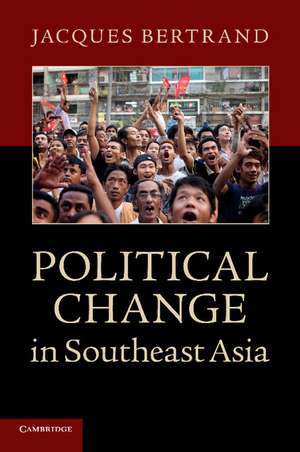Political Change in Southeast Asia
Autor Jacques Bertranden Limba Engleză Paperback – 10 iul 2013
| Toate formatele și edițiile | Preț | Express |
|---|---|---|
| Paperback (1) | 259.95 lei 6-8 săpt. | |
| Cambridge University Press – 10 iul 2013 | 259.95 lei 6-8 săpt. | |
| Hardback (1) | 632.84 lei 6-8 săpt. | |
| Cambridge University Press – 10 iul 2013 | 632.84 lei 6-8 săpt. |
Preț: 259.95 lei
Nou
Puncte Express: 390
Preț estimativ în valută:
49.75€ • 51.75$ • 41.07£
49.75€ • 51.75$ • 41.07£
Carte tipărită la comandă
Livrare economică 15-29 aprilie
Preluare comenzi: 021 569.72.76
Specificații
ISBN-13: 9780521710060
ISBN-10: 0521710065
Pagini: 258
Ilustrații: 2 b/w illus. 12 tables
Dimensiuni: 151 x 228 x 12 mm
Greutate: 0.36 kg
Ediția:New.
Editura: Cambridge University Press
Colecția Cambridge University Press
Locul publicării:Cambridge, United Kingdom
ISBN-10: 0521710065
Pagini: 258
Ilustrații: 2 b/w illus. 12 tables
Dimensiuni: 151 x 228 x 12 mm
Greutate: 0.36 kg
Ediția:New.
Editura: Cambridge University Press
Colecția Cambridge University Press
Locul publicării:Cambridge, United Kingdom
Cuprins
Preface; 1. Understanding political change in Southeast Asia; Part I. Capitalism, Economic Growth and Political Change: 2. Indonesia and Timor-Leste; 3. The Philippines; 4. Malaysia, Singapore; 5. Thailand; Part II. State Socialist Countries and Authoritarian Stability: 6. Vietnam; 7. Cambodia and Laos; 8. Burma/Myanmar; 9. Southeast Asia in the twenty-first century; References; Index.
Recenzii
'At last a book that provides a comprehensive, historically grounded and up-to-date survey of politics in Southeast Asia. Covering the historical origins of the diverse regimes that make up the region, as well as the forces driving political change today, Political Change in Southeast Asia will be welcomed by both experts and students of the region. Paying attention to evolving social structures and complex contingencies, mass social forces and the actions of elites, Jacques Bertrand captures the complex dynamics both driving and retarding political change in this fascinating and politically diverse region.' Edward Aspinall, Australian National University
'For decades, the study of Southeast Asian politics has remained confined to single-country studies, with the diversity and complexity of the region thwarting more broadly conceived and comparative work. In this magisterial survey, Jacques Bertrand provides a synthetic account of the variegated patterns of political change across the full breadth of Southeast Asia. Bertrand's command of the field, and the clarity and coherence of his analysis, make for a study unparalleled in breadth of coverage and depth of insight. Scholars and students of Southeast Asian politics will remain indebted to Bertrand for this foundational text for many years to come.' John Sidel, Sir Patrick Gillam Professor of International and Comparative Politics, London School of Economics and Political Science
'A political survey of all Southeast Asia is not for the faint-hearted. Its half-billion people comprise all the world's major religions, hundreds of ethno-linguistic groups, and among the world's richest (Singapore) and poorest countries. Its politics neatly divide between communist-authoritarian, democratic, what Bertrand calls 'semi-democracies' (Malaysia, Singapore, Thailand) and plain authoritarian (Cambodia and Burma). Jacques Bertrand manages this task with a sure and experienced hand, judiciously covering all its eleven countries except Brunei. Students will be well-served by its comprehensiveness, accuracy and balance.' Anthony Reid, Emeritus Professor, Australian National University
'In this much-anticipated new text, Jacques Bertrand makes a clear case for Southeast Asia as politically distinctive, if not wholly unique. Adjudicating among dominant explanations for political change or stasis that stress the role of economic development in structuring political patterns (and vice-versa), the influence and interests of elite actors, the strength and priorities of class-based or other social forces, and cultural features such as patrimonialism, Bertrand offers a pithy, well-focused, and accessible introduction to Southeast Asian politics, spanning the diversity of states in the region through the present day. The book presents both succinct political histories of each state and a cogent analytical approach, making it ideal for undergraduate or graduate classroom use.' Meredith L. Weiss, University at Albany, State University of New York
'For decades, the study of Southeast Asian politics has remained confined to single-country studies, with the diversity and complexity of the region thwarting more broadly conceived and comparative work. In this magisterial survey, Jacques Bertrand provides a synthetic account of the variegated patterns of political change across the full breadth of Southeast Asia. Bertrand's command of the field, and the clarity and coherence of his analysis, make for a study unparalleled in breadth of coverage and depth of insight. Scholars and students of Southeast Asian politics will remain indebted to Bertrand for this foundational text for many years to come.' John Sidel, Sir Patrick Gillam Professor of International and Comparative Politics, London School of Economics and Political Science
'A political survey of all Southeast Asia is not for the faint-hearted. Its half-billion people comprise all the world's major religions, hundreds of ethno-linguistic groups, and among the world's richest (Singapore) and poorest countries. Its politics neatly divide between communist-authoritarian, democratic, what Bertrand calls 'semi-democracies' (Malaysia, Singapore, Thailand) and plain authoritarian (Cambodia and Burma). Jacques Bertrand manages this task with a sure and experienced hand, judiciously covering all its eleven countries except Brunei. Students will be well-served by its comprehensiveness, accuracy and balance.' Anthony Reid, Emeritus Professor, Australian National University
'In this much-anticipated new text, Jacques Bertrand makes a clear case for Southeast Asia as politically distinctive, if not wholly unique. Adjudicating among dominant explanations for political change or stasis that stress the role of economic development in structuring political patterns (and vice-versa), the influence and interests of elite actors, the strength and priorities of class-based or other social forces, and cultural features such as patrimonialism, Bertrand offers a pithy, well-focused, and accessible introduction to Southeast Asian politics, spanning the diversity of states in the region through the present day. The book presents both succinct political histories of each state and a cogent analytical approach, making it ideal for undergraduate or graduate classroom use.' Meredith L. Weiss, University at Albany, State University of New York
Notă biografică
Descriere
A powerful new survey of political change in Southeast Asia, exploring why some countries have become democratic while others remain authoritarian.










